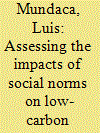| Srl | Item |
| 1 |
ID:
183577


|
|
|
|
|
| Summary/Abstract |
Policymakers and scientists are paying increasing attention to how social norms can promote pro-environmental behaviour and sustainable energy use. We contribute to this field by experimenting with and assessing the impacts of social norms on low-carbon mobility options. Taking Sweden as a case study, we develop two complementary randomised controlled experiments to: 1) analyse the role of social norms in promoting the adoption of car sharing services (CSS) via descriptive and injunctive norms (N = 720); and 2) investigate potential crowd out effects when injunctive norms are used to promote a low-carbon transport hierarchy (N = 730). First-order effects show that social norms have a positive but marginal impact on the willingness to adopt CSS, and only injunctive norms have the potential to steer behaviour in the desired direction. Results also suggest that concerns about potential substitution effects between low-carbon transport options and CSS are not valid. With due limitations, our findings have various implications for policymaking, notably that for social norms to be effective, other policy instruments are critically needed. Of particular importance are the environmental effectiveness of CSS and complementarities between public transport and active mobility (i.e. walking and cycling).
|
|
|
|
|
|
|
|
|
|
|
|
|
|
|
|
| 2 |
ID:
111357


|
|
|
|
|
| Publication |
2012.
|
| Summary/Abstract |
The twelfth five-year plan (FYP) endorsed by the People's National Congress in March 2011 plays a crucial role in shaping China's development trajectory over the next decades , and especially for the fulfillment of the 40-45 carbon intensity reduction target by 2020. The plan will condition both the medium and long term perspectives of economic restructuring, rebalance between the inclusive economic growth and environmental objectives, which are compounded by multiple constraints faced by China such as aging population, natural resources depletion, energy supply security and environmental deterioration. This article investigates the major energy and climate targets and actions specified in the 12th FYP to gain insights into the nature and magnitude of challenges and difficulties with regard to the medium and long run economic and environmental policies. It points out that China should articulate sectoral policies with the global climate mitigation targets to avoid long term carbon lock-in. Based on an in-depth analysis of the objectives in the plan, it is argued that the implementation should include mainstreaming developments of appropriate instruments to support cost-effective energy efficiency improvements and carbon intensity reduction in the next five years.
|
|
|
|
|
|
|
|
|
|
|
|
|
|
|
|
| 3 |
ID:
190610


|
|
|
|
|
| Summary/Abstract |
Despite the consensus that green taxation is an effective way to accelerate the decarbonization of economies, few countries are implementing ambitious tax reforms. This is the case of diesel for transport in Spain. The arguments against boosting the diesel tax stressed its potential adverse effects on the economy and society, accusing it of being a regressive policy. In this paper, we shed light on the distributional impact of raising the excise tax on diesel to the same level as on gasoline for final consumers in Spain and various compensation schemes jointly designed with several stakeholders. The results confirm that raising the diesel tax without offsets would have slightly regressive effects and that rural and middle-income households would bear the brunt of the increase. However, the effects become progressive when the co-designed offsetting schemes are implemented. These findings may help decision-makers in achieving a just, acceptable, and politically viable energy transition.
|
|
|
|
|
|
|
|
|
|
|
|
|
|
|
|